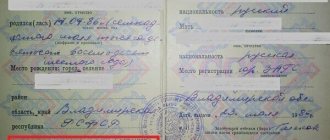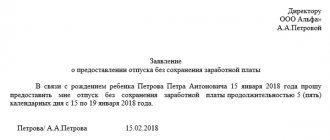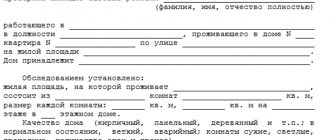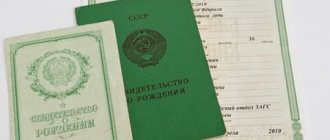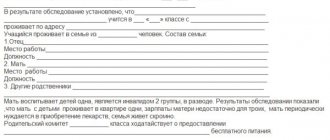As a general rule, the birth certificate record includes, in particular, information about the child’s father (last name, first name, patronymic, date and place of birth, citizenship, nationality (optional), place of residence), as well as information about the document that is the basis for entering such information (clause 1, article 22 Federal Law of November 15, 1997 No. 143-FZ
).
In some cases, it may be necessary to exclude information about the father from the birth record, for example, when establishing paternity of another person (Article 49 of the RF IC
).
Depending on the situation, it is possible to exclude information about the father from the child’s birth certificate out of court or in court.
Extrajudicial procedure for excluding information about the father from the birth record
If the child’s parents are not married to each other and paternity has not been established, information about the child’s father can be included in the birth record at the request of the mother. The father's surname is written according to the mother's surname, the name and patronymic of the child's father - according to her instructions. At the same time, the entered information is not an obstacle to resolving the issue of establishing paternity (Clause 3, Article 17 of the Federal Law of November 15, 1997 No. 143-FZ
).
In this case, a mother who is not married to the child’s father has the right to contact the civil registry office at her place of residence or at the place where the birth record is stored with an application to change or exclude information about the child’s father in the birth record (clause 1 of Art. 71 of the Federal Law of November 15, 1997 No. 143-FZ
;
clause 23 of the Administrative Regulations, approved. By Order of the Ministry of Justice of Russia dated December 28, 2018 No. 307
(hereinafter referred to as
Administrative Regulation No. 307
).
In addition to the application, you will also need (clause 2 of article 69, article 71 of the Federal Law of November 15, 1997 No. 143-FZ
;
clauses 23, 34, 50, 79.52 of Administrative Regulation No. 307
):
• mother's identity document;
• child's birth certificate;
• receipt of payment of state duty. If information about its payment is contained in the State Information System on state and municipal payments, it is not necessary to submit a receipt.
Reference.
Amount of state duty For making changes to a civil status record, including the issuance of a certificate, a state duty of 650 rubles is charged. (Clause 5, Clause 1, Article 333.26 of the Tax Code of the Russian Federation).
The application must be considered within one month from the date of its receipt. If there are good reasons, the consideration period may be increased, but not more than by two months (Clause 1, Article 72 of the Federal Law of November 15, 1997 No. 143-FZ
).
If the application is granted, the change in the civil status record is made by the civil registry office at the place where the corresponding record of the act is stored on paper.
Based on the amended civil status record, the applicant is issued a new birth certificate (Article 73 of the Federal Law of November 15, 1997 No. 143-FZ
;
clauses 79.77, 79.87 of Administrative Regulation No. 307
).
Changing a child's surname with the consent of the father
The RF IC provides for the possibility of changing the surname of a child who has the father’s surname to the mother’s surname (Clause 1, Article 59). To do this, his permission must be obtained. But under certain circumstances, the pope’s consent is not necessary if:
- He is missing;
- Deprived of parental rights;
- Recognized by the court as incompetent;
- Avoids education for unknown reasons.
Help: If a mother wants to change the surname of a child over 10 years old to her own surname, his consent is required.
The above circumstances must be confirmed by a court decision.
Mandatory attendance at trial
You can achieve a much faster result - remove the father from the birth document if the father abandons the child. But he must be present at the court hearing. The parent must submit the following documents:
- fill out a written refusal;
- write a statement indicating your reason for abandoning the child;
- present your passport.
These documents are attached to the case and submitted to the judge. If he does not consider himself a dad and refuses to pay child support, then he is actually deprived of parental rights.
It will be useful: Did you know how to properly file a divorce from your husband if you have children?
What does it mean to revoke paternity?
The exclusion of a record of kinship implies the presentation of a demand for the annulment of the record made in the Civil Registry Book.
To cancel a record, a court decision must be made to challenge paternity, even in cases where all participants in the legal relationship agree to make changes.
The obligation to contact the authorized body for consideration of the case is established in Art. 47, clause 3 of the Civil Code. A statement of claim to challenge paternity is filed in cases where the person recorded as a parent is not the person who actually is.
Such situations occur, for example, when the husband was on a long business trip at the time of conception of the child. Paternity can also be contested if a person cannot be a parent due to health reasons.
The entry of parents in the birth register, made in accordance with paragraphs 1 and 2 of Article 51 of this Code, can only be challenged in court at the request of the person recorded as the father or mother of the child, or the person who is actually the father or mother of the child, and also the child himself upon reaching the age of majority, the guardian (trustee) of the child, the guardian of the parent recognized by the court as incompetent.
The request of a person registered as the father of a child on the basis of paragraph 2 of Article 51 of this Code to challenge paternity cannot be satisfied if at the time of recording this person knew that he was not in fact the father of the child.
Thus, the only reliable evidence that you are not the father of the child will be a DNA test. In addition, the court will compare the dates of marriage and birth of the child. Through examination, it is possible to assess parameters at birth (height, weight, etc.), fetal viability at birth 3 months from the moment of conception.
An important circumstance in cases of this category is the provision specified in paragraph 1 of Art. 52 of the Family Code of the Russian Federation, according to which the right to challenge in court the entry made about the father of a child is not limited by any statute of limitations.
The court may consider the following claims in the course of claim proceedings:
- on the exclusion of the entry about the father made in the birth certificate in accordance with clauses 1 and 2 of Art. 51 RF IC;
- about entering new information about the father (that is, about establishing the paternity of another person), if there is no dispute on this issue between the interested parties (for example, between the child’s mother, the person recorded as the father, and the actual father of the child).
The Family Code does not exclude the right of the father to challenge the entry made on grounds of violation of the will (for example, if the application for recognition of paternity was filed under the influence of threats, violence, or in a state where the plaintiff was not able to understand the meaning of his actions or control them).
When considering cases challenging the record of paternity, the court also takes into account the rule of Art. 57 of the RF IC on the child’s right to express his opinion.
How to choose a first name, middle name and last name?
Married parents must choose a name for the child and decide what surname and patronymic he will bear. They must do this together.
There are certain rules governing this choice:
- The name must be agreed upon by both parents.
- If the name is offensive or immoral, the civil registry office may refuse to include it on the child's document.
- The middle name must be written using the name of the child's father.
- The surname must belong to either the father or mother of the child. You can combine them - then he will have a double surname.
If the parents cannot come to a mutual decision regarding the name, patronymic or surname, the dispute must be resolved by the guardianship authorities. They should also be contacted if parents want to give their child a unique name that is not in the name directory.
Note! If the marriage is not registered, the child's mother chooses the name. The rest of the data is also set by it. The biological father has no right to influence her decision or name the child himself.
How to remove an entry from a certificate? Let's look at examples
Let's look at a few examples to clarify some of the details in practice. Let's take the conventional characters Oksana and Vasily and place them in various life situations.
Situation 1. The spouses are legally married
Introductory: Vasily and Oksana are married and have a child. However, Vasily received information that he was not his father.
Decision: If at the time of birth no one declared paternity, then in accordance with Art. 122 and 133 of the IC, Vasily is recognized as the father, and Oksana as the mother of the child. If new circumstances are identified, Vasily has the right to file a lawsuit to challenge paternity under Art. 136 SK.
The case will be considered similarly (and on the same legal grounds) if the child was born within 9 months after the divorce.
Situation 2. Couple in a civil marriage
Introductory: Vasily and Oksana are not married, but have a child together. Vasily received information that he is not a blood relative of the son registered in his name.
Solution: Being an official parent according to the deed record, Vasily has all the rights and opportunities described in the previous example - he can also challenge paternity in court.
Situation 3. Father's whereabouts are unknown
Introductory: Oksana and Vasily once met, but have not seen each other for a long time. During this time, Oksana had a daughter, whose paternity was recognized “according to her mother,” and Vasily was recorded as the father. Recently Oksana met Vasily again and filed a lawsuit against him for alimony.
Decision: In accordance with Art. 135 IC Oksana had the right to register her daughter as Vasily, but this is not an automatic recognition of paternity. If Oksana proves in court that the minor child is really Vasily’s, she will be able to claim alimony, otherwise not.
Situation 4. Abandonment of an adopted child
Introductory: Before the wedding with Oksana, Vasily knew that she had children from her first marriage and adopted them.
Over time, the couple divorced, Vasily decided to abandon the children, proving that he was not their father. Decision: In accordance with paragraph 5 of Art. 136 of the Family Code, a father who knowingly knew that he was not a blood relative of the child, but who drew up the appropriate registration record, cannot challenge his paternity.
Situation 5. The father is deprived of parental rights
Introductory: After divorcing Oksana and Vasily, the latter was deprived of parental rights. Oksana, having remarried Anton, wants to write the father out of the child’s certificate.
Decision: Art. 166 of the Family Code does not imply the removal of responsibility from the father when his parental rights are deprived. But with the mutual consent of Vasily, Oksana and Anton, the child can be transferred to the latter.
Situation 6. The father is a foreigner and is abroad
Introductory: Vasily met Oksana, being a citizen of another country. After some time, he left for his homeland, and Oksana gave birth to a child and registered him as Vasily.
Decision: Regardless of citizenship, in accordance with Art. 135 IC Oksana could give any surname to the child, which does not impose additional responsibilities on Vasily. If Oksana proves paternity in court, then its recognition in Vasily’s homeland will depend on interstate agreements between Ukraine and the country of which Vasily is a citizen.
Depending on such agreements, Vasily may either be recognized as a full-fledged father, with all the attendant responsibilities, or not be fully recognized as such. However, when he appears in the legal field of Ukraine, he falls under Ukrainian jurisdiction and can be held accountable for failure to comply with a court decision (in accordance with Article 23 of the Law of Ukraine “On the Legal Status of Foreigners”).
Who can file a claim?
Guided by the Family Code, the cancellation of a paternity record can only be carried out by judicial authorities and only upon the application of a person from a circle defined by law. Namely:
- the person recorded as the mother or father in the child’s birth certificate;
- a person who is the actual parent of the child;
- the child's guardian;
- the child himself, but only as an adult;
- guardian of the parent, if he is recognized as incompetent.
Grandparents do not have such powers. This is due to the fact that actions aimed at excluding an entry are a personal matter for those persons indicated in the Book as parents.
An exception is when grandparents act as legal guardians of a child of a minor mother and father (under 16 years of age).
Official registration of marriage.
After the official registration of the relationship, the woman’s husband will automatically be recorded in the “father” column.
This rule also applies if the child is born within 300 days after the divorce or death of the spouse.
In court, a man can challenge his paternity, for which a genetic examination is carried out.
Official registration of marriage gives the child property guarantees in the event of dissolution of the union between his parents or the death of one of them.
Therefore, when planning a child, many couples still visit the registry office. After registering the marriage, the father's surname will be assigned to the newborn automatically, as well as the patronymic.
How to file a claim?
The claim is filed in writing with the obligatory indication of the details provided for by the norms of civil and family law.
Thus, the claim must include:
- name of the court, full name and the address of the plaintiff (or his representative);
- justification for the violation of the rights and legitimate interests of the party and a description of its requirements;
- the facts and legal framework relied upon by the plaintiff;
- evidence supporting these facts;
- information that the pre-trial procedure for contacting the defendant has been followed (if this is provided for in the agreement of the parties or federal law);
- list of documentation attached to the claim.
A sample application can be downloaded here.
If the defendant does not agree with the claims, he has the right to file a response to the statement of claim with the court. Consideration of claims is carried out by the regional authorized authority located at the defendant’s place of residence. The applicant must pay a fee. He must attach to his demands documents confirming his claims.
The applicant can also provide letters to other authorities and involve witnesses in the proceedings. The plaintiff can provide evidence confirming that the person recorded as the child’s father is not his biological father (Article 55 of the Code of Civil Procedure of the Russian Federation).
Such evidence may include, for example, the results of genetic testing, witness statements, and other documents (personal correspondence, photographs). You can use all known methods and means to challenge paternity.
With the help of forensic medical examinations the following can be established:
- time of conception (forensic gynecological examination);
- the defendant's ability to have children;
- presence (absence) of a family relationship with the child (biological, molecular genetic examination).
During the examination, medical documents are also examined: an individual card of a pregnant woman, a birth history, an individual card of a newborn child.
Samples of the application, as well as details for paying the state fee, can be found in the offices of district courts or on their websites.
Where can I go to remove the record of paternity?
To start the process of resolving a dispute regarding paternity, you should apply to the court with the appropriate statement of claim.
Filing a claim to annul paternity in court is possible at any time from the moment the child is born.
The claim is filed in the district court at the defendant’s place of residence. The court satisfies requests to order a genetic (other medical) examination and to include additional evidence during the hearing.
If the child's father evades genetic testing, the court makes a decision based on all previously presented evidence.
The court, depending on which party avoids the examination and what significance it has for it, has the right to recognize the fact for the clarification of which the examination was appointed as established or refuted. If the claim to challenge paternity is satisfied, the court makes an appropriate decision.
In the operative part of the decision, the court indicates which entry is incorrect (which registry office body made it, the number and date of the entry, in relation to which persons it was made), what changes or corrections need to be made to it.
What surname will the child receive if the parents are not married?
If a man and a woman did not formalize a union, but lived in a civil marriage, then after the birth of a minor, you will need to perform the following steps.
• Jointly visit the state body that carries out registration. • Provide the required package of documents. • Fill out the application in the prescribed manner. • Receive a document.
The surname of the father of a child in a civil marriage.
Download the parental agreement on assigning a surname to the child here:
Agreement between parents on assigning a first name (surname) to a child.
Even after paternity is recognized, the child may retain the mother's surname. You can add a man to your birth certificate at any age, including after adulthood.
If the father agrees to recognize the child as his own, then a genetic examination will not be necessary.
The procedure is necessary only if the registration takes place through the court or the man doubts his paternity.
